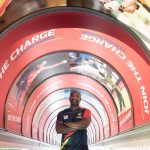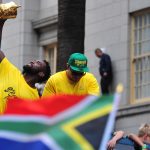Bongi Mbonambi, always beating the odds
At one point, the Springbok hooker doubted he would be in Japan for the 2019 Rugby World Cup. But he knuckled down and became a valuable member of the world conquering squad.
Author:
30 November 2019

There isn’t a player who has beaten more odds to become a member of the victorious Springbok World Cup squad than hooker Mbongeni Mbonambi – not even their heroic leader, Siya Kolisi.
Not since his youth – when he was the first-choice hooker in Dawie Theron’s South African Under-20 side of 2011, which featured World Cup luminaries like Kolisi and the controversial Eben Etzebeth – has Mbonambi been the first choice for his position.
Being in the back seat, never in the driving seat, and sometimes not in the vehicle at all is a situation that 28-year-old Mbonambi has worked to overcome since making his Super Rugby debut for the Bulls in 2012.
“From when I started out at the Bulls, I’ve always been the smaller kind of hooker and never really made the weight of the hookers they wanted,” he says. “But I’ve always had this work rate inside of me that other hookers didn’t achieve at that stage. That’s the only thing I used to my advantage. I knew I could get a little bigger and stronger, and everything is a testament to how hard work pays off.”
Apples and trees
Mbonambi is the spitting image of his father, Mpinda, who despite possessing all the frame and size of an amateur era front-rower never touched a rugby ball. A police officer, Mpinda was known in Bethlehem’s football and baseball circles. And Mbonambi’s mother, Nombulelo, a professional nurse, did a bit of track and field in her youth.
“I wanted Bongi to be a doctor, but he showed me that he has his own destiny and that he wasn’t going to be what I wanted him to be,” says Nombulelo, the pride in her voice evident over the telephone line.
“He was very passionate about his rugby. He used to say it himself that he was going to be a professional rugby player. I had never known of such a profession. I only know of a teacher, a lawyer, a doctor, a nurse… those are the professionals that I know.”
Related article:
Although he started as a physically imposing loosehead prop, Mbonambi used his smarts to navigate his way up the rugby ranks. At home, he had learnt that making sure his homework and duties were done ahead of time was the ticket that bought him time to play outside.
His dedication was enough to earn him a rugby scholarship to St Alban’s College in Tshwane. The school pried him away from Voortrekker High School in Bethlehem, where the mother of famous Springboks Jannie and Bismarck du Plessis, Jo-Helene, had tutored him.
Competing with his idol
A swimmingly glorious path to rugby stardom – now as a combative hooker – hit the skids a number of times the higher he rose. Chances to get valuable game time shrank like a pair of jeans in hot water.
He took his talents to the Bulls’ hot rival union Western Province and the Stormers at the beginning of 2015.
“At the time, the motive for the move was opportunity,” says Mbonambi. “I just wanted to give it a shot. I never really saw it as a place where I’d really make it. But after a few months and I’d started training, I had a mindset change.
“I thought to myself that I can make things work for my future. I knew that their favourite player was Scarra Ntubeni and I was seen as competition to him. But I never saw it as competition, I was just hungry for game time. Once I got here, I saw that I could really make this work if I give it my all and from there, things changed for the better.”
The Stormers switch paid dividends when, in 2016, he was called up to then Bok coach Allister Coetzee’s first incoming tour squad. In what was quickly developing into a theme for Mbonambi, opportunity came with Herculean challenges.
In his way stood Adriaan Strauss, captain and one of the few shining lights of Coetzee’s largely forgettable two-year tenure. He sat on the bench like a boy in detention for two straight Tests against Ireland before eventually getting his debut, in Port Elizabeth, in the three-Test series decider.
Although he got to wear his Springbok blazer, he had all but two minutes of game time. The media almost forgot that he had even played. Their microphones at the post-match press conference at the Nelson Mandela Stadium lusted over Steven Kitshoff, the “main” debutant.
Mbonambi crawled away into seeming oblivion. It would be another 11 Tests off the bench and almost 18 months before he started for his country, against Italy in 2017.
Related article:
“It’s how people perceive you. They focus more on the outside rather than what the player can give on the field,” he says. “A lot of players might not have a lot when it comes to size, but once you give them a purpose and put them on the field, they can demonstrate to the world what they really have.
“Once you get to international level, you wanna play more. You want to experience that level for as long as you can and you want to get that game time going. But I was still young and I learnt as much as I could from Adriaan, who was a great player and a great captain.
“There did come a time when I questioned whether I was really going to make the World Cup at that rate. I told myself that no matter what happens, no matter where I am, whether it’s a training camp or a tour, whenever I’m needed, I’m just going to give my all.
“Listen, it doesn’t matter whether they pick you or not. You’re here at the end of the day and you need to show them why you’re here.”
Earning his stripes
Before he fell into the hands of the coach that showed him true love, Rassie Erasmus, Mbonambi had to fight through the stigma that he “can’t throw”. He was an easy target for social media bile.
An overthrow into a defensive lineout in the 2018 Rugby Championship that cost the Springboks the game against Australia had him written off and counted out, yet again.
“I took the criticism as motivation for myself, but it does get to you,” he says. “You start doubting and questioning yourself. I don’t really read a lot of media stuff that’s written, but it does come through to you in some way or another.
“Throughout the whole week after the miscommunication between myself and Siya happened, the whole team took it very hard. But looking back on that loss to Australia, a week later we faced New Zealand and we beat them for the first time in their backyard in 10 years.
“We had exactly the same team, the same jumpers, nothing changed. We just had to focus more on our execution. As hookers, things get blamed on you most of the time. But then again, this year, we only lost one lineout during the World Cup.
“People don’t talk much about that, but they would have if we had missed half our lineouts. They would have said the Springbok lineout is in crisis. People look for the mistakes.”
Redemption did come in the form of a game-winning substitute appearance against France last year, when he hit four lineouts from four before scoring the match-winning try.
Up against the best
By now he had evolved into the best lineout drive marshal in the world. But he had one more massive mountain to climb: Malcolm Marx.
“No one really focused on whether they would be starting or they would be on the bench. Everyone in the squad had the one goal of winning the World Cup and that was it.
“Whether I was starting, or Schalk [Brits] or Malcolm were starting, it didn’t really matter because we knew that we were going to have our time to play, and when that time came you had to show that you can do the job on the field.”
The 2019 World Cup was a transcendent tournament. Mbonambi left Japan with a proud 100% tackle success record and a lineout record to match. He scored three tries and made multiple telling contributions, including being part of a feared front row.
Related article:
He worked the hardest to get to Japan and made the most of the opportunity once he got there. Nowhere does the winner’s medal sit more deservingly than around the neck of a man counted out time and again.
“What a crazy story, hey,” he beams, almost disbelievingly. “I look at the medal quite a lot. My wife tells me I must put it somewhere where I won’t remember where to find it, so that when I find it the joy will come back again.
“It has really been amazing. The whole journey makes one feel so humble. It’s humbling to think that we can achieve so much with a group of guys.
“We all come from different backgrounds and cultures, but once you pull into camp and pull on that jersey, it really just unites us. We knew that it wasn’t just about us or even the World Cup. It was about 57 million back here in South Africa watching.”



